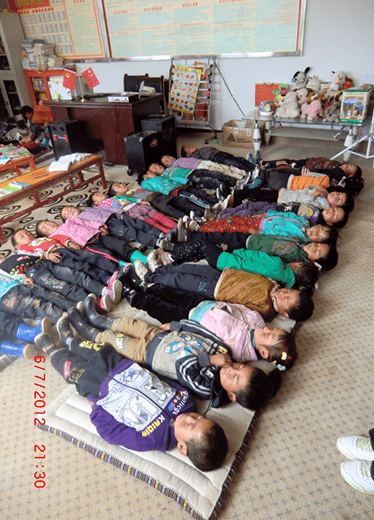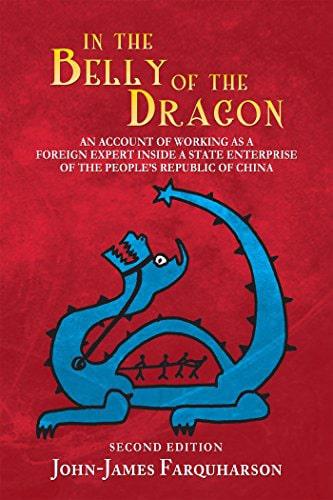
John-James Farquharson, born in Bonn 1956, is a Scot / German citizen, studied at Oxford and Insead and worked several years in different roles (Finance, Marketing, Operations and later HR) for international companies such as BP and BASF. In 2009 he decided to go to China as an HR “foreign expert” to work for the large chinese state-owned enterprise ChemChina. John-James Farquharson, descendant of a Scottish clan and ex military, summarised his experiences in China in his book «In the Belly of the Dragon». He describes his work in China as Chief HR Officer and shows the reader a completely different world that many of us may not have been exposed to. In his book John-James Farquharson not only illuminates the entrepreneurial peculiarities in China, but also deals with the psychology and culture of the Chinese, the little tiny nuances, which he got to know and appreciate during his time in there, including Chinese food. In the interview with Xecutives.net, he answers questions about China, also about the ongoing problems in Hong Kong and Tibet, and the country’s future. His views are cautiously optimistic. China is facing great challenges. His conclusion in the interview is: „Let’s hope – also for our sake in the West – that they are successful.“
Xecutives.net: Dear Mr. Farquharson, you’ve spent three years as top manager (HR foreign expert) for a very big state-owned enterprise in the People’s Republic of China. I’ve just read your book «In the Belly of the Dragon», in which you describe what happened in those three years. But first I would like to ask you how it came that you and your family, especially your wife, made the decision that you would stay so long abroad, without knowing exactly what would await you? Other people would probably tend to think of a cruise on an idyllic sea, but you decided to work for a longer period in an Asian country. I have also learnt that you and your wife have sponsored a Kindergarten in a Tibetan Prefecture now for nearly ten years. How did that come to be and how does this work?
John-James Farquharson: First to the Kindergarten, yes that is correct, we got to know the Kindergarten teacher during our travels back in 2010 – the village lies at 3,500 meters above Tongren (Rebkon in Tibetan) at the altitude where agriculture stops and the nomad life starts. There are 49 children. Income from the book and talks I give around Switzerland go straight to the Kindergarten. Readers are more than welcome to make a donation too (below you will find my Swiss IBAN account as I am permitted – at least up to now – to make private donations into this otherwise sensitive area).

And now to your first question: Curiosity – I think when you pass fifty you need to do something different or you just go stale where you are. My wife grew up in Hamburg and where we lived at the time was pretty much in the countryside so that 3 years in Beijing was quite an attractive idea to her. The children were grown up and starting their university studies in Europe, that made the family logistics a lot more straightforward. My father was a diplomat so I grew up in about seven countries, and we have lived and worked in several more, but never in Asia. Yes, it was mainly curiosity.
Xecutives.net: Your name is not common here in Switzerland and Germany. I’ve heard, that «Farquharson» is also the name of a Scottish clan. Are you a Scottish clan-descendant? At least you have served in the British army for several years, an important fact in your life, and obviously something, that helped you a lot dealing with critical projects and all kinds of different people in China…
John-James Farquharson: Yes that’s correct, we’re one of the smaller Scottish clans. A few years in the British Army, or any Army, doesn’t do you any harm. A spell on active service also teaches you to throw your diary away which is the first thing you should do when you arrive at a China SOE (state-owned enterprise). The interview process focussed less on HR and almost entirely on my 2 years in Northern Ireland, which my China colleagues saw as the UK’s version of Xinjiang …I think we come back to that further on.

Xecutives.net: Your book offers readers a lot of information one cannot get in current books about China. You’re talking about the roots, about the little tiny details in China’s business culture. Your’re describing all of this with humor, also with real British, even black, humor. But, reading your anecdotes and findings, it get’s clear, that there is something going on in China and only a handful of people here are aware of what this does mean for us and the future. Does this surprise you? What will happen in the next couple of years regarding China and our approach towards Chinese people?
John-James Farquharson: I’m quite concerned about what is happening right now. China has moved from a current account surplus, more or less continuous since 1993, into a deficit situation which is unlikely to get any better with the trade tariff tit-for-tat. This will make Western inbound investment more necessary, already forcing some relaxation of ownership and operating scope, that at least is positive. But the ongoing impressive infrastructure investment, military build-up and extensive security apparatus all cost money and it is not clear to me where this is going to be coming from. China is facing a rapidly ageing population, the workforce has already peaked, and has not built up the Western pension infrastructure we are fortunate to have. As I said in the book, I conducted many retirement discussions with state employees, may tearful as it dawned on the couple, most still in their fifties, that the household budget – over the thirty years they were still likely to live – simply wasn’t going to add up. An ageing population also has, and this may surprise readers, serious social stability consequences we will come back to.
Xecutives.net: In the interview with Christian Walsoe, who gave deep insights in China’s Belt&Road initiative, it became clear, that China’s economy has a great impact on our lives. China bought Syngenta, for whom you have also worked in Basel, the biggest company investment ever, which has an impact on Basel and it’s region, only to mention one example. Why are we blind regarding China, so that many people even nowadays are not informed about what is happening and China is still no issue at all in schools? This at least is my impression after several discussions about China with a lot of people, also Chinese people.
John-James Farquharson: Yes, I think it’s important to remember that China goes back much further than 1949. In the 1500’s while my ancestors in the Highlands would spend their time jogging up a damp hillside in a kilt with a spear looking for something to eat, Chinese talents would be sitting the national Civil Service exams…
Many of our early Western perspectives were influenced by the fact that we invaded China first in the South moving up to the North. So until quite recently Chinese cuisine for us was essentially Cantonese cooking. Fortunately that’s changing and the diversity between North and South (people, spoken language, food) is becoming better understood. By the way, Southerners pronounce the capital “Pakking” which explains why we say “Peking”.
But to answer your question, China is a very complicate place, it’s like opening an excel sheet – after a few minutes you work out how the rows and columns add up, then you click on a box and another excel pops up and then another. As the weeks, months and years passed, I realised just how little I really understood about this vast country.
We need to be a little honest here, the basic values of the peoples who make up China are fundamentally different from our Western values – restricted news and now – I’m afraid – increasingly blacked out western TV coverage means that knowledge (we spent the summer in China) is decreasing year by year. This has a serious impact too on foreign language ability as 90% of what our youngsters read is now on-line. I can remember interviewing candidates for the High-Potential Program I ran for BASF 30 years ago over a weekend in Xinhua university in French and German, that would be much less likely to happen today. I think over time, we will see more people learning Mandarin across the world than Chinese citizens learning English, that might help us to better understand China in the future.

Xecutives.net: Until we know how the Chinese and the Chinese system work, it is impossible to find strategies for working with China in a good way. What do we need to learn about China from a global and overarching perspective in order to find a cultural and business base with China?
John-James Farquharson: Again, we need to be a bit honest with ourselves here, while we can share a common respect with regard to our histories, language and food (important), it is unlikely that we will find a deeper common business base, because the systems are too different. ChemChina will never try to “assimilate” or integrate Syngenta. I have worked for both companies at different times. It just simply wouldn’t work – just look at CSR – Corporate Social Responsibility. Last week I did a session for the Swiss Board training on etiquette, meetings dinners and pitfalls to avoid in China, these are important and not difficult to master, but otherwise both sides just need to respect that the basic values are fundamentally different and that isn’t going to change. If you – as Chief HR Officer – had had to fire a young and talented couple on the spot because they had dared to “start” a second child in the family without the authorities’ consent, you would begin to understand what I mean. By the way, the second time this happened, I was allowed to whisk them off to the UK, where we had acquired a company, as expatriates in the nick of time. They’re now back in China, second child born while living abroad: problem solved.
Xecutives.net: You have worked with so many Chinese and other managers and members of the State Owned Assets Supervision and Administration Commission (SASAC) overseeing all those state-owned companies in China. Can China, in your HR management experience-view, succeed in achieving all the goals China has set itself for the next 50 years? And if so, what does this mean for us here in Europe?
John-James Farquharson: Many of my colleagues – nearly all party members – often expressed a real fear that the People’s Republic might “disintegrate and implode” like the Soviet Union. This was a genuine feeling. This together with the trauma of having been effectively occupied for 100 years by the Western Powers together with Russia and Japan, in a rare act of them working all together, should help to explain the almost allergic reaction towards anything that smacks of separatism or “splitism”. This isn’t just hysteria, it’s a well grounded concern and one we need to understand if we are dealing with China today.
From about 1500 to 1700 a.d., China made up about a third of the global economy. What followed was a serious dip, and what we are witnessing now – in the eyes of many of my colleagues – is not so much a “rise” but just returning China to it’s “situation normal” place in the world. I think it’s important that we understand this thinking process even if we don’t agree with the results.

Xecutives.net: That is a very interesting point, also when it comes to Hong Kong. We recently had the opportunity to speak in Basel when I first asked you for an interview. I remember the moment when I asked you about China and some risks about the country and it’s people. Some people seemed a little confused about my question. Here is the question again: China is full of risk potential and there are reasons to have some doubts about China’s future. The party has been very successful to date in hiding certain risky hotspots by blocking information about what is really happening in certain places in China, just as an example in the Uyghur region or in Hong Kong. In your view, if I do understand you right, there is a real danger that the party will lose control, as was the case in other countries, such as Russia a few decades ago?
John-James Farquharson: The real risk to the Party’s long term control of the People’s Republic over the next 50 years does not lie in Xinjiang, Tibet or Hong Kong or even Taiwan. It lies in a combination of three things within the core Han people: the nation’s readiness for an ageing population, a growth rate that is likely to dip, if it hasn’t already, below 6% p.a. and the migrant labor issue – and all three are more closely related than many realise.
I had to deal with several “strikes” and “petitions” or what we used to call “social stability situations” – most of which you will never hear or read about. The strange thing for me was that we rarely negotiated with the work-force itself, it was mum, retired at 50, and Granny we had to face and I can tell you it was pretty tough. If you have a thousand youngsters in a factory – single children – and each has two parents and four grandparents who live ten minutes walk from the plant – then you can do the math(s) and work out what happens 45 minutes after the “strike” starts…the town basically comes to a standstill. It was a pretty one-sided negotiation. We tend to imagine that China is 1.4 Billion people who simply do as they’re told. The truth, I can tell you, is very different.
Xecutives.net: What does exactly happen in such strike situations, we do not now anything about here?
John-James Farquharson: I can tell you: Granny – now mid seventies and nearly toothless, grew up in the cultural revolution, her baby brother probably died of starvation and she is as tough as nails and her numbers are swelling by thousands every day as the population ages. Her son in law is likely to be a migrant laborer working on a building site on the East Coast, he will enjoy no local medical cover or social security, no children’s education in the city where he works, and a miserable pension awaiting him back in Anhui province.
In 1989 Beijing had a million students, today it has – in addition – ten times that number of migrant workers many of whom are being turned out of the old air raid shelters they have squatted in for years – these are the kind of issues which will need to be handled with great sensitivity.
Many in the West believe that the mainland population, like those in Hong Kong, are “dreaming” about democracy. This is nonsense. Granny is much more worried about her son in law on the East Coast, her daughter’s pension and her (only) grandson who is working in a Chemical plant far inland where fewer alternative employment opportunities exist. That is what she thinks about as she goes to sleep.
The current administration will, as I hope, be successful in understanding these issues and be skilful in addressing the growing pension deficit as the population ages, if it does, it will still be in power in 50 years from now.
Now to the West: My wife and I spent several weeks in the summer this year travelling across Qinghai, Gansu and briefly into Sichuan. These provinces, along with Ninxia, have significant Muslim and Tibetan minority populations. There is no doubt in my mind that life for these people has become more restricted over the last 2 years and I would need several pages to list out specific examples. Some of this may be related to the build-up towards the 70 year celebrations but I don’t expect to see a lot of loosening up now. Western Press tends to focus on the situation in Tibet Province itself, and more recently on Xinjiang with the Uyghur people (pronounced by the way “ooi-goohr” and not “Wigger”). The truth is, the whole of the West of China – Qinghai, Gansu, Ningxia and Western Sichuan, about half the land area of the People’s Republic in total – is now sliding inexorably towards a similar situation that already exists in Tibet and Xinjiang.

Xecutives.net: This does not sound very optimistic…
John-James Farquharson: We also need to be honest about our own past too. I remember a cup of tea with a retired PLA Colonel who had spent time in London. The UK – he explained – was a miniature version of China, I never quite thought of it like that, I said. “You” English are like us Han Chinese, we hold everything together, The Welsh are the Mongolians (used to have splitist tendencies), the Scots behave as badly as the Tibetans, and worst of all are the restive Western provinces – for us Xinjiang, for you: Northern Ireland.
In one interview about my Army time in the “restive Western province” I was asked about the re-education camps in Belfast. I said there weren’t any. But what about the “H” block? – my interviewer was well briefed – that too was a prison I explained – and how long were the terrorists sentenced to the “H” block? They weren’t sentenced, I explained, they were interned. What, without trial? Correct, there was no trial. And was the “internment” effective? No, I said, it was a waste of time – completely counterproductive. This was back in 2012.
I’m not trying to condone what is happening in Xinjiang, but we need to remember, while we think we are as white as snow in the West, actually, we aren’t. The overall situation in the West of China is not only distressing and unpleasant it is also quite puzzling. China has about 25 million Muslims, about the population of Saudi Arabia, but only about half are Uyguhr, the other half belong to groups like the Huy and Dongxiang – spread out across the country. The Huy are not Turkic but Mandarin speakers, and for hundreds of years have been integrated, respected and accepted by the Ming and Qing dynasties – in fact right up to 2012 “useful” allies of successive governments in Beijing. Now, a bit like the poor Kurds in Northern Syria, they appear to have outlived their strategic “usefulness” and are also being subjected to restrictions and reprisals. I confess, I have difficulty understanding what this is supposed to achieve.
To be quite clear, I don’t believe that either Tibet or Xinjiang should become independent countries, this is not in their interest at all. The best way forward is to generate greater understanding and respect among the majority Han Population and there are some glimmers of hope here. We saw several Tibetan villages being turned into little “Disney lands” for the well-heeled and high-heeled Han middle-class to step out of their air conditioned coaches at three-and-a-half thousand metres like they do in Lucerne and take snaps. Actually, this may be a good thing in the longer term..
Xecutives.net: In your book you are describing the discrepancies between certain regions in China itself. China is as different as all the countries are in Europe. What makes the difference and, even more important, what do people in China have in common?
John-James Farquharson: With the exception of Mongolian, Turkic, and Tibetan speakers, the Chinese have been blessed sharing the same written language over thousands of years. In Europe we use the same symbols for numbers, but pronounce them differently. Now imagine we did the same with words and all shared the same written form! This has held China together for a very long time.
With regard to China’s rich diversity, I have a theory which one day I may be able to put to the test. I will ask a friend to organise a trip to 5 different Chinese cities: Lanzhou, Beijing, Wuhan, Lhasa and Shanghai. We arrive at each city’s airport at lunchtime just after the taxi drivers have eaten their lunch. The drivers must be local: Xizang-ren in Tibet, Beijng-ren in in the capital and so on. My friend doesn’t tell me in which order he has planned each city. On arrival I am blindfolded, can’t see where I am. I wear head-phones, can’t pick up any accents. I wear thick gloves, so I can’t feel the taxi dashboard – is it a Santana, Peugeot or a Hyundai? etc. – Cities tend to do deals with the major car companies. I’m used to sitting in the front in Taxis as it’s the best way to learn the language. My bet is that within 30 seconds of climbing aboard I will tell you in which city we are.
Xecutives.net: What is the reason in order to find out where you are?
John-James Farquharson: The reason is the food and it’s delicious smells: Lanzhou Lamian noodles, fatty boiled Tibetan Yak, sizzling hot from Wuhan, no smell at all in Shanghai, but GARLIC in Beijing, here you don’t even need to climb aboard, just open the cab door and take a deep breath. Now try doing that in the US – every airport just smells the same! China is not a country, it’s a continent with a lot of richness.

Xecutives.net: But coming back to Hong Kong, the demonstrations in Hong Kong, where it is not clear what else could happen, are worrying at the moment and even shaking the markets. Opinions are very divided here. How do you assess the situation in Hong Kong and how will the Chinese, whom you know best from the long cooperation, react to this unrest? How will the Chinese power structure react, is there a certain logic pattern, that will appear, something deep in the chinese mindset that makes them react in such a way and not in another way?
John-James Farquharson: With regard to Hong Kong or “Xiang-Gang” in spoken Mandarin, I can only give you my personal opinion: I don’t think the PLA will march in; the central government will simply sit it out and let the demonstrators just wear themselves down. With probably the fifth largest stock exchange in world, highly ranked in the global competitiveness index (it’s just notched up again) there is too much cash value at stake here. It may today be only around 3 % of the China economy, but even 3% is a hell of a lot of money, but I don’t see an “exit ramp” either. Of course, we could all wake up tomorrow morning and be proved horribly wrong ….
Xecutives.net: In your book you also show a lot of respect for what China has created and done in the last 50 years. Where in Europe could we learn from China? What is it that we could adapt to be more efficient and productive just for instance?
John-James Farquharson: In the US, I have worked for US corporations, and more so in Europe, we have built up a lot of “baggage” over the last 70 years around unions, works councils, co-determination and data protection. Switzerland has been a bit more sensible in this regard. Don’t get me wrong, I’m not saying this was all a mistake, but we should be aware that some of the mechanisms we have developed provide a handbrake in an emergency transformation situation.
This “handbrake” doesn’t really exist in China and a transformation can be much faster: let me give you an example. The biggest challenge we faced in China was work safety, with one fatality every 7 weeks. Together with the Party Vice-Secretary (over a couple of beers) we worked out a pretty drastic plan; any failure to wear protective kit like a hard hat would mean an immediate 20% drop in the month’s salary. The employee’s photo would be posted up on the site entrance, and the rage he would have to endure from his wife would make him think again. It worked, in 2011 we had no domestic fatalities among 35,000 employees. Now would that have been permitted by European Union works councils, unions and all the data protection?
In Summary, the People’s Republic have made mind blowing progress lifting hundreds of millions out of poverty, the next 50 years will be more complex, and the issues around the West of China, an ageing migrant labor force and ageing population in general, and overall interaction with the West along with balance of payments challenges and significantly slower growth will require a lot of skill from the country’s leadership. Let’s hope – also for our sake in the West – that they are successful.
Xecutives.net: Dear Mr. Farquharson, thank you very much for giving your time for this interview. I wish you much success for your projects and your cultural studies regarding China!
(C) 2019 by Christian Dueblin. All rights reserved. Other publications are only permitted with the express permission of the author.
IBAN for Kindergarten donations:
- in CHF: CH91 0027 3273 2944 9340 X
- in EUR: DE27 2004 0280 2676 00






